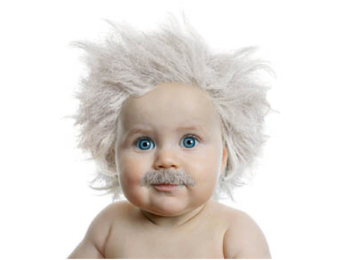What goes on in an infant’s brain? Thirty years ago, psychologists would unanimously have said newborns are egocentric, illogical and irrational. Today we know that they are miniature scientists. Research shows that at a subconscious level they perform statistical analyses to form hypotheses about how the world works. Increasing or diminishing the probabilities related to their observations on the basis of new incoming data, previous hypotheses are re-examined and reality becomes clearer. Already at nine months of age infants show an interest for statistics. Show an infant a box in which you put 80% red balls and 20% white balls. Then take out of the box five white balls in a row. This is an unlikely event and already at this age infants show curiosity for what happened. Instead, if you take five white balls out of your pocket, where they do not know the number and color of the sample of balls, they show little interest. Infants know that some events are more likely than others and they use this knowledge to build ideas about the world they live in.


Leave a Reply